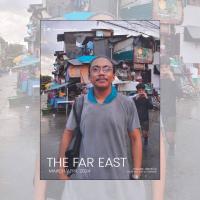In March the houses of 450 Catholic families in Pakistan were destroyed and those of 1,000 Christians will be bulldozed by Government officials in the upcoming days.

Photo: Eric Siraj
Columban Fr Robert McCulloch who worked in Pakistan for 34 years was interviewed about this human disaster by Inés San Martín, the Rome Bureau Chief for Crux (an independent news service covering the Vatican and the Catholic Church).
Christians from Kali Mori in the city of Hyderabad in Pakistan suddenly found themselves without a home after the Supreme Court ruled that municipal officials had to free encroached lands both in Hyderabad and in Karachi. They ruled that the homes are on state-owned land and that their presence makes the cities of Hyderabad and Karachi more flood-prone by blocking the path of rainwater to the sea and obstructing access to canals connected to the Indus River.
The houses were first built 40 years ago and are legally connected to the public electricity, gas and water grids. “This is a civic crisis and human tragedy. Municipal authorities are responding to the civic crisis, but not to the human tragedy” said Australian Fr Robert McCulloch, the Rome-based Rector of Collegio San Colombano who lived in Pakistan from 1978 to 2011.
He told Crux that there has been a perennial encroachment problem in Pakistan, with people occupying Government-owned land. This, he said, has been a reality for the past 30 or 40 years, when people from the northern province of Punjab moved towards the growing cities in the south of the country to seek jobs. Most were peasant farmers working the land of feudal landlords and living in villages that had reflected their culture and pattern of life for several centuries.
The ongoing mechanization of agriculture in the early 1970s disrupted both the structure of land-tenure and its use and the traditional patterns of rural life. This led to a major demographic change in Pakistan as people moved from the land to the cities. This process of mass movement happened just after Hyderabad and Karachi in the south had been able to adjust to the problems created 30 years earlier. At that time in 1947, the influx of several million Muslim refugees from India to Pakistan after communal rioting afflicted the newly emerged nations of Pakistan and India. This new mass movement of people has caused unplanned large-scale urbanization that continues even now. It was and is characterized by the absence of town planning and by social crises and civil breakdown.
When people first began to arrive in the 1970s, Christians, mostly Catholics, began settling in fringes around Hyderabad and they settled in temporary shacks that eventually became permanent homes.
“There is no doubt that the land they’re on is encroached,”
Fr McCulloch said. “But they have long been connected to the water and gas grids, which gave a sense of stability to the people living there. The fact that they were all paying taxes to representatives of the municipal council in their areas, either over or under the table, made them believe they had some sort of legal claim over the land.”
Fr McCulloch said that the community saw Government officials providing them with public services and no one told them they illegally inhabited the land.
This continued for decades until the homes became a liability. “Some 450 Christian families, in a particular area that I know, lost their homes in the past six days and when they complained to the police and officials who were there to oversee the destruction, they were told that they were encroaching,” said Fr McCulloch.

Photo: Eric Siraj
The people, whose homes in Kali Mori have been destroyed due to encroachment, bitterly comment that Pakistan’s Prime Minister, Imran Khan, also built his mansion on encroached public land at Banigala near Islamabad but his home has not been bulldozed. Even though encroachment is happening all over the country some encroachers can get away with it.
Fr Robert said that in the coming weeks there will be another 1,000 Christian families who will lose their homes, as the bulldozers and tractors continue to bring down the homes.
“Had their grandfathers and fathers been told when they arrived that they couldn’t settle and to instead go a little bit further out in the city where there was available and fairly cheap land to buy, they would have done so. Most of those who arrived back then didn’t know how to read and write, which made them more gullible to believe whatever civil authorities told them" said Fr McCulloch.
“From their point of view, they asked if they could put their homes there and were told yes. But from that minute they were told to pay taxes” he said. “The people who enabled them charged them taxes of one sort or another instead of telling them not to build their homes there.”
Making an already bad situation worse, the thousands who have overnight found themselves homeless are having trouble finding homes to rent in both Karachi and Hyderabad because of the sudden increase in demand and soaring rents.
The situation is made worse by the fact the Government is not likely to do anything to help those affected.
In 2011 St Elizabeth Hospital in Hyderabad set up the Bethlehem Shelter Society to buy land and build homes for the many people who lost their homes in the massive floods that year and in 2010. Eight hundred and seventy five families, mainly Hindu, received help and are now safely housed. Fr McCulloch said he hopes to buy land that the Church can donate to these newly affected homeless Christian families so that they can begin rebuilding with the certainty they will have title to the land.
Columban Fr Donal McIlraith, Mission Awareness and Education, Fiji.
Listen to "Destruction of housing in Pakistan"
Related links
- Read more from The Far East - May 2021

